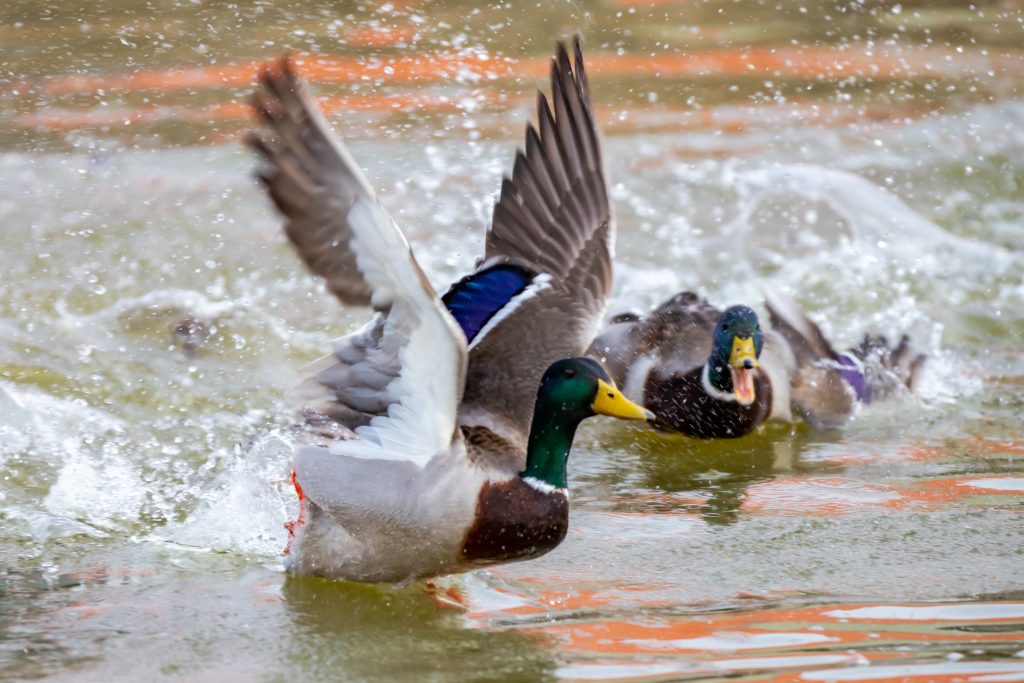Help us take care of our birds this spring
Trentham is lucky to host over a dozen species of waterfowl, thanks to our diverse mosaic of habitats and of course our 65-acre Brownian Lake! For many species, this is their spring and summer home, where the lake provides the sublime conditions for raising that season’s brood. However, our winters, which we may often find drab and cold, are but a balmy refuge for a myriad of migrating arctic species, such as Gadwall, to wait for the chilly northern winters to subside.
Despite this, we also have birds not native to Britain that take up the lake as a new home, such as the black swans that you will see come and go freely between Trentham and local water bodies. The species originates from Australia, having been introduced to the UK in the 19th century.
We have advised not to feed or tempt birdlife, as it often encourages birds to gather or move into each other’s territory which can result in unnecessary distress and even fights and injuries. Our resident dominant Mute Swans take over the main body of the lake as their breeding territory and you will observe other swans and species establishing nests outside of this sight line. Our team will be looking out for nests appearing by pathways and we will ask visitors to give these a wide berth.
A sign of spring you can spot already, is the growing messy nests of our herons on our 4 Victorian Islands. Trentham is lucky to host a heronry, which has grown to 42 nests in years previous. Grey herons look like they’re straight out of prehistoric times, resembling a pterodactyl – and they sound like one too! When gliding over-head, they often sound a “Frarnk” like call, and while nesting, they create a diverse series of yelps and squawks. When working on the islands on less busy days, it can feel like you have passed through a portal back to the Jurassic! If you want to get up close to our primordial heronry, why don’t you take a trip on our Discovery Cruise on Miss Elizabeth – dates are here.
It’s been great to herald the arrival of two other birds. Firstly, a flock of 20 or so tufted ducks has been spotted in the open waters of the lake. Tufted ducks are diving ducks, so called because they plunge to the bottom of waterbodies to sift through the silts for food. We had moderate breeding success last year, but we want to boost the numbers with the improvement of lakeside habitat. Secondly, we are eager to announce the return of our oystercatchers. These wading birds feature a long orange bill to probe for invertebrate prey and their call is iconic – look it up!

It’s not easy to be a duck, swan, grebe, moorhen, egret, or heron, especially at this time of year. As the daylight lengthens into spring, this can trigger the aggressive responses required to establish a territory and start a family. It is not unusual to see swans clashing and ducks dueling, all with the overriding motivation to reproduce. This is a normal repertoire of behaviour and helps to create a diverse and shifting array of species for you to enjoy!
Please follow our DUCK rules when strolling around the lake and enjoying our waterfowl.
Dogs always on short leads and 5 meters away from waterfowl.
Understand the risks of Avian Flu for birds, (see guidance signs on site or speak to our team about how you can support this).
Cease the feeding of waterfowl.
Keep back from nests and young; adult birds can be aggressive.
We understand the appeal of feeding our waterfowl, however this activity can have disastrous consequences, which are often not the intention of the feeder! These range from causing bold and dangerous behaviour in our waterfowl to spreading deadly Avian Flu.
Here at Trentham, we are all excited for the wildlife wonders this Spring will bring. Please join us in supporting the Estate’s magical habitats and importantly – enjoy them!